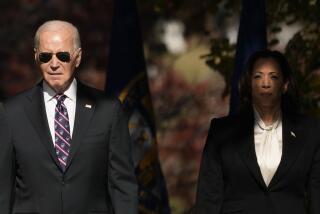Analysis:: Democrats move left, Republicans move right, middle ground disappears

Hillary Clinton speaks to supporters in Las Vegas after winning Saturday’s Democratic Nevada caucuses.
Hillary Clinton usurped much of Sen. Bernie Sanders’ message and benefited hugely from the power of women and minorities in the Democratic Party as she reasserted command of the presidential nomination race with her victory in Nevada.
But trying to hold onto those groups and handle the party’s ideological leftward swing will be a tough task during what remains a lengthy nomination fight.
Meanwhile, as her party continues to shift to the left, Republicans face a mirror-image situation -- a rightward swing during this campaign that has put the party at odds with much of the country, whether the future nominee is front-runner Donald Trump or one of the other candidates fighting for prominence beneath him.
That growing division between the two parties seems set to make the job of president all the more difficult for whoever wins.
Clinton’s victory in Nevada served as an emotional boost for a campaign that had struggled since Sanders’ landslide in New Hampshire. Clinton worked feverishly to shore up the bulwarks of her campaign here -- female and minority voters -- to the point that she met with hotel housekeepers well after midnight Wednesday to urge them to caucus for her.
TRAIL GUIDE: All the latest news on the 2016 presidential campaign >>
She has always seemed to campaign best when truly threatened. And, after a weak win in Iowa and the devastating New Hampshire loss, she clearly was. The fear running through her campaign and its network of supporters was of a bad showing that would undercut her assertion that she would be the strongest Democratic nominee. Clinton had seen that happen before: Her early losses to Barack Obama in 2008 led to a cascade of voters away from her and ultimately cost her the nomination.
Now, however, Clinton has the opportunity to follow up a Nevada win with a victory in South Carolina next Saturday. There, her campaign is buttressed by strong support among African Americans, who make up half or more of the Democratic electorate.
Sanders’ path forward is less secure. He retains legions of supporters and an overflowing bank account that will allow him to stay in the race until the primaries close in June. But although he framed his showing Saturday as a moral victory, he failed the test that Nevada presented to him: breaking Clinton’s hold on women and minorities. In the end, Clinton held onto almost 6 in 10 women and nonwhite voters. Sanders maintained his supremacy among young voters and other groups, but it was not enough.
Part of the reason was Clinton’s ability to adapt to the challenge Sanders’ campaign posed.
Like expanding amoebas, successful candidates often absorb the popular approaches of their opponents, thus strengthening themselves and blunting the competitor. In Clinton’s case, confronting Sanders has meant moving to the left, albeit without his rush-the-barricades language.
Twice in her victory speech on Saturday, she said that the country was not working “the way it should” — an interesting acknowledgment for a candidate who has emphasized her close ties to and loyalty toward President Obama.
“If we listen to the hopes and heartaches of hard-working people all across America, it’s clear there is so much more to be done,” she said.
“We are all in this together,” she added, reprising a line from her husband’s 1990s campaigns. But she followed it with a shot at corporate America.
“Let me say this to the men and women who run our country’s corporations,” she said. “If you cheat your employees, exploit consumers, pollute our environment or rip off taxpayers, we’re going to hold you accountable.
“But if you do the right things,” she said, “we’re going to stand with you.”
Sanders’ campaign has been a passionate cause for his supporters. Clinton’s operation has seemed somewhat bloodless, more about her than her supporters. She reached out deliberately on Saturday.
“You turned out in every corner of this state with determination and purpose: hotel and casino workers who never wavered, students with too much debt and small-business owners who never go off the clock, tens of thousands of men and women with kids to raise and dreams that don’t die -- this is your campaign and it is a campaign to break down every barrier that holds you back.
“We hear you, we see you, we’re incredibly grateful to you because we’re in this together,” she said.
Her ability to adopt part of Sanders’ argument appears to have stabilized Clinton’s campaign. But it also means that whichever candidate wins, the definition of the party’s goals will have moved leftward.
The shift among Democrats was apparent in the answer Nevada voters gave when asked if the next president should generally continue Obama’s policies. About half the Democratic voters said yes, according to the entrance poll of caucus participants. But another 4 in 10 wanted a more liberal approach beginning next year.
Asked to describe themselves, 7 in 10 Democrats said they were either “somewhat liberal” or “very liberal.” Only a quarter described themselves as moderate. That’s a markedly more liberal electorate than the one that showed up for the last contested Democratic caucus, eight years ago. Just over 40% of Nevada Democrats in 2008 called themselves liberals.
Republican voters in South Carolina were occupying the opposite territory on the far right of the political spectrum.
Almost 4 in 10 described themselves as “very conservative,” and an even higher figure -- 43% -- said they were “somewhat conservative.” Fewer than 2 in 10 Republican voters described themselves as moderate.
It is no surprise that the candidates have been delivering what their voters want. On the Democratic side, that has meant a focus on income inequality and tough rhetoric about the wealthy. Among Republicans, the emphasis has been on a sharply conservative view of the world and the issues the country faces.
In their speeches Saturday night, South Carolina winner Donald Trump and the top two finishers, Florida Sen. Marco Rubio and Texas Sen. Ted Cruz, talked of eradicating Obamacare, and offered a very religious view of the world and the nearly apocalyptic threats facing the country.
Join the conversation on Facebook >>
Whoever wins the GOP nomination will have obtained it with that strongly conservative message, and if successful would find a yawning gap between himself and the half of the country that disagrees, just as either Clinton or Sanders would win with a liberal message that automatically alienates the half that voted Republican.
Whoever wins the presidency will step to the podium on the West Front of the Capitol next January and pledge to unite all Americans behind a common purpose. After this campaign, however, that is far more likely to be rhetoric than reality.
For political news and analysis, follow me on Twitter: @cathleendecker . For more on politics, go to latimes.com/decker.
ALSO
Lopez: The presidential race is so awful you can’t look away
Why neither Hillary Clinton nor Bernie Sanders can claim a win in the Latino vote in Nevada
Rubio and Cruz scramble to scoop up donations as Republican race broadens to more states
More to Read
Start your day right
Sign up for Essential California for news, features and recommendations from the L.A. Times and beyond in your inbox six days a week.
You may occasionally receive promotional content from the Los Angeles Times.







